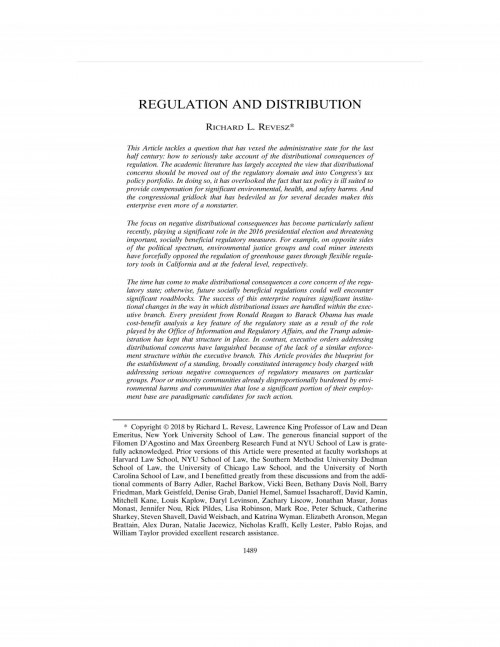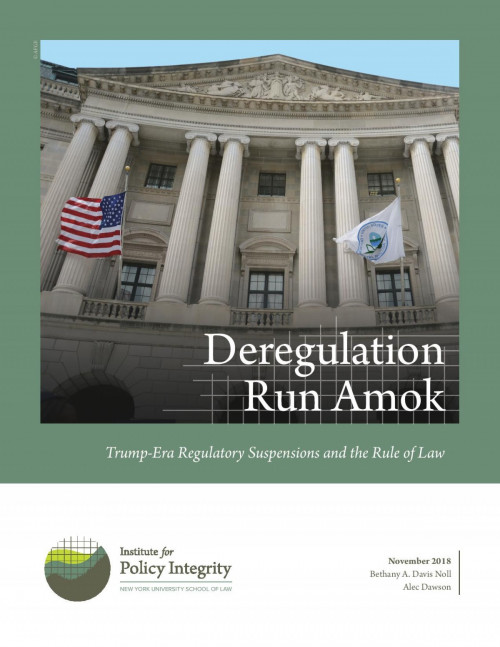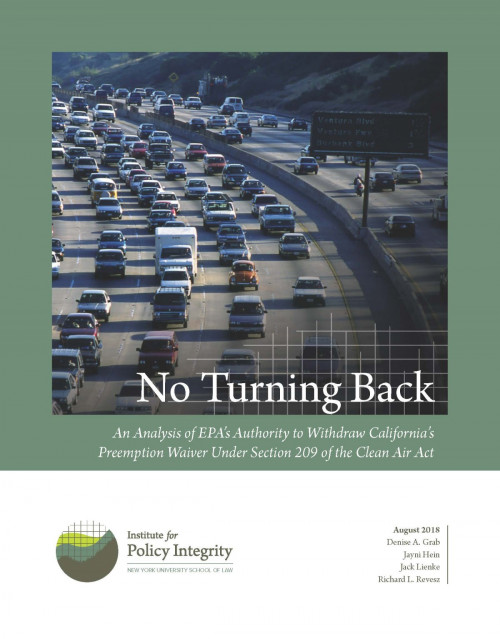-
Comments to EPA on Reconsideration of Methane Standards for New Sources
In 2016, EPA finalized a set of performance standards for new, reconstructed, and modified sources of methane and volatile organic compounds (VOCs) in the oil and natural gas sector. A recent proposal, however, aims to weaken the 2016 rule in a variety of ways, with the goal of reducing the regulatory “burden” on industry. We submitted comments that focus on inadequacies in the cost-benefit analysis accompanying the proposed rule.
-

Regulation and Distribution
This article, published in the New York University Law Review, tackles a question that has vexed the administrative state for the last half century: how to seriously take account of the distributional consequences of regulation. Academic literature has largely accepted the view that distributional concerns should be moved out of the regulatory domain and into Congress’s tax policy portfolio. In doing so, it has overlooked the fact that tax policy is ill suited to provide compensation for significant environmental, health, and safety harms. And the congressional gridlock that has bedeviled us for several decades makes this enterprise even more of a nonstarter. The time has come to make distributional consequences a core concern of the regulatory state – otherwise, future socially beneficial regulations could well encounter significant roadblocks. This article provides the blueprint for the establishment of a standing, broadly constituted interagency body charged with addressing serious negative consequences of regulatory measures on particular groups.
-
Roundup of Trump-Era Deregulation in the Courts
The Trump administration has undertaken numerous deregulatory actions through rule suspensions; repeals; rescissions; efforts to weaken regulations through guidance, memoranda, amendments, or replacements; and more. Many of these actions have been challenged in court and decisions have been reached in several cases.
The Institute for Policy Integrity maintains a publicly available list of the outcomes of those lawsuits. This “Roundup,” which we update regularly, has been cited by the New York Times, the Wall Street Journal, the Washington Post, Bloomberg, E&E News, and the Brookings Institution.
The Roundup provides an overview of each court decision, with relevant links to the government actions and court rulings. It also tallies the successful and unsuccessful outcomes for the administration for ease of reference. Updates should be submitted to [email protected].
-
Comments to FERC on Rio Grande Natural Gas Project
The Federal Energy Regulatory Commission (FERC) prepared a Draft Environmental Impact Statement (DEIS) for the Rio Grande LNG Project. Despite quantifying over 8 million metric tons of carbon dioxide-equivalent emissions per year from operations, FERC does not account for the climate effects of these emissions. We submitted joint comments that offer a detailed rejection of FERC’s arbitrary and misleading rationale for failing to monetize the project’s climate effects. We urge the agency to apply social cost of greenhouse gases estimates.
-

Deregulation Run Amok
Trump-Era Regulatory Suspensions and the Rule of Law
Our report provides a survey of the legality of Trump Administration’s regulatory suspensions. Looking at a number of cases, we discuss the administration’s disregard for notice-and-comment requirements, statutory restrictions, and the reasoned explanation requirement. We also lay out some of the challenges facing advocates, and the strategies by which agencies have evaded review.
-
Comments on Proposed Clean Power Plan Replacement
EPA recently issued a proposal to replace the Clean Power Plan (CPP) with a far weaker rule that will increase greenhouse gas and soot- and smog-forming emissions from the electric sector. Our comments explain why repealing the CPP is unnecessary, irrational, and harmful.
-
Comments on Proposed Weakening of Vehicle Emissions Standards
In August 2018, the Trump administration issued a proposal to dramatically weaken federal emissions standards for cars and light trucks, and to revoke the waiver that allows California to set its own standards. Federal emissions standards have been enormously successful at reducing greenhouse gas pollution and lowering fuel costs for consumers, and we recently submitted five separate sets of comments detailing the flaws with the Trump administration’s proposal.
-

No Turning Back
An Analysis of EPA’s Authority to Withdraw California’s Preemption Waiver Under Section 209 of the Clean Air Act
For 50 years, California has enjoyed unique authority to regulate air pollution from newly manufactured motor vehicles. While the Clean Air Act preempts all other states from setting their own vehicle emission standards, California can request a waiver to do so if it determines that its standards are at least as protective of public health and welfare as federal standards issued by the U.S. Environmental Protection Agency (“EPA”). Once a waiver is granted, other states can adopt California’s more stringent vehicle emissions standards as their own. EPA has now proposed to withdraw the waiver California received in 2013 to set its own greenhouse gas emission standards. Because a waiver withdrawal would be entirely unprecedented, neither courts nor legal scholars have previously had cause to discuss the circumstances, if any, under which a waiver might permissibly be withdrawn. This report analyzes whether EPA possesses revocation authority and, assuming it exists at all, when and how such authority may be exercised. It is an update to the August 2018 version of the same report.
-
Comments to the California Air Resources Board on its Cap-And-Trade Program
The California Air Resources Board (ARB) is extending and changing its cap-and-trade program for greenhouse gases. We recently submitted comments that outline ways the ARB can improve its proposed updates.
-
Expert Testimony on Colorado’s Low Emission Vehicle Program and the Social Cost of Carbon
We recently submitted expert testimony on the benefits of Colorado’s proposed Low Emission Vehicle Program. The LEV program could avoid millions of tons of greenhouse gas emissions, and we explain to the Colorado Air Quality Control Commission the importance of and methodology for monetizing the real-world contributions of those emissions to global climate change. Our report shows, by applying Social Cost of Carbon estimates, that Colorado’s proposed LEV program could generate billions of dollars’ worth of climate benefits.
Viewing recent projects in Climate and Energy Policy






